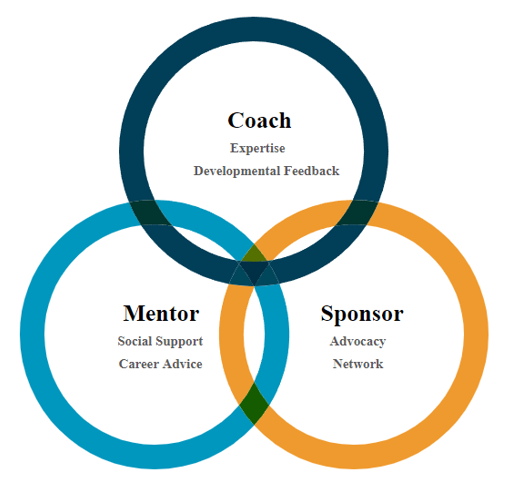“Will you be my mentor?”
If someone has to ask this question, the answer is probably no.
On one hand, it’s not clear from the question what type of support or commitment is needed (“What exactly will I do as a mentor? Do I have time to mentor this person?”). On the other hand, professional support comes in many forms, from career advice to expertise to advocacy — and we need support across all of these dimensions to thrive.
This is what I call the Myth of the Magical Mentor: the idea that a single person can (or even wants to be) the silver bullet for all of your developmental needs. Ultimately, YOU are responsible for your future — and you’ll probably seek out multiple people to guide you along the way.
What is a Personal Board of Directors?
Think of yourself as the CEO of your own career. As CEO, you are responsible for setting a long-term vision, strategy and plan for achieving your goals. You’ll also need to market yourself, invest in your skills / education and make key decisions. Many organizations and non-profits have a Board of Directors that helps guide the CEO and hold them accountable to their goals — and you can have one too.
A Personal Board of Directors is a small, informal group of people that you can reach out to for support when navigating your career. These “Directors” are invested in your success and ideally represent a diversity of backgrounds, perspectives and experiences. Their counsel ensures that you’ll have a trusted advisor to turn to at every major decision.
The ASCEND Model
According to Harvard Business School Professors Ting Zhang and Leslie A. Perlow, there are 6 primary areas of professional support: Advocacy, Social support, Career advice, Expertise, Networks and Developmental feedback (ASCEND):
📣 Advocacy
What: public support (e.g. to get you referred, hired or promoted, even in the face of resistance), protection from detrimental situations (e.g. from time-intensive or inapplicable assignments) or access to unique “stretch” opportunities that help you learn and grow.
Who: this person is usually a direct manager or senior stakeholder who has influence or authority within an organization. Importantly, they are willing to put their reputation on the line to advocate for you, even when you’re not in the room.
🤲 Social Support
What: private support (e.g. friendship, emotional support or validation of an individual’s experiences), which promotes productivity, job satisfaction and emotional well-being.
Who: this person is usually a peer (or a few years older than you) and may share your lived experiences (e.g. race, gender), though not always. Importantly, they practice active listening and hold space for you without judgment. Note that there is a fine line between venting about your problems to someone and thoughtfully seeking their support. Therapists and mental health specialists are particularly helpful here!
❓ Career Advice
What: guidance to help you make decisions that benefit your short- and long-term career goals. Advice can be general (“What career paths are out there? How do they match up with my skills and interests?”) or situation-specific (“Should I take Job A or B? How do I have this difficult conversation with my manager?”).
Who: this person is usually in a position that you aspire to be in someday. As you narrow down the options, you’ll likely seek out many of these people in your lifetime — and the more varied their outcomes, the better. They are especially helpful when it comes to evaluating potential paths 5, 10 and 20 years into the future.
🧠 Expertise
What: knowledge (the “what”), know-how (the “how”) or concepts (the “why”) — like an entrepreneur sharing their tips for B2B sales, a software engineer walking you through the codebase, or an analyst walking you through your first financial model.
Who: anyone with more industry experience or subject-matter-expertise than you, regardless of seniority. They could also be professors, authors, podcast hosts, content creators or thought leaders outside of your network.
👥 Network
What: connections to people in their network who can help you more effectively or directly than they can on their own. This person helps make intros, gives referrals or recommends that you browse their LinkedIn connections and reach out.
Who: this person usually has a large rolodex and is eager to facilitate mutually beneficial connections... keyword being “mutual.” For more info on how to ask for a warm intro, see my prior article here.
💬 Developmental Feedback
What: feedback, both positive and constructive, to help you understand when you are excelling and when you are falling short. Neither purely critical or encouraging, this person evaluates your past performance and provides specific feedback to help you improve in the future.
Who: this person is usually a direct manager, teammate or someone with whom you work closely. This could also include your customers, vendors, shareholders and other business stakeholders. Feedback is a gift!
Types of Directors
Boiling down the ASCEND model, three types of Directors emerge: Coaches, Mentors and Sponsors.
As you can imagine, it is nearly impossible to find one person who covers all 6 bases — and the level to which these roles and support areas overlap varies considerably. For example, some Directors play multiple roles (coach & sponsor) while others only offer one type of support. In addition, some roles may lend themselves better to a longer time-horizon (mentors) than others (coaches).
Mapping Out & Diversifying Your Board
Just like in business, the best Boards bring a variety of backgrounds, perspectives and experiences to reduce the risk of coming to a biased or underinformed decision. When mapping out your Board, ensure that you have a diverse mix of gender, race and other demographic backgrounds and life experiences. “Diversity of thought” is not enough.
⚠️ This is important even if you have a marginalized identity.
In my first job in investment banking, I made the mistake of believing that Asians and women were more likely to mentor me because they might more easily relate to my identity. As a result, I rarely reached out to anyone outside of those demographic categories.
Unfortunately, there were few Asians and women in banking to begin with, especially at the senior level — limiting my pool of potential mentors significantly. Moreover, it was naïve to assume that women and Asians are a monolith (they’re not) — and that they’d be more willing or able to mentor me simply because of their gender or race.
Instead, seek out individuals who:
Actively listen and try to understand your situation before providing advice
Guide you to your own conclusions (vs. forcing their own opinions on you)
Ask thoughtful, introspective questions (vs. having all the answers)
Challenge your assumptions and provide a fresh perspective
Are genuinely invested in your success, even at the expense of the company’s
Tell you what you need to hear, not what you want to hear
Balance encouragement with constructive, specific feedback
Is an expert in a subject that you want to learn more about
Are in a position or role that you aspire to be in one day
See the “big picture” whether it be industry trends, crafting a balanced life, etc.
💡 Your turn!
Take a moment to reflect on your professional relationships by filling out the worksheet HERE. List names of current or prospective Directors in the left-hand column and mark an X in each column to indicate the type of professional support you are receiving / hope to receive from them.
In what areas of support are you abundant? In what areas are you lacking? Take note of any gaps with regards to professional support areas as well as diversity.
Building & Maintaining Relationships
Now that you’ve mapped out your Board of Directors, it’s time to engage them!
🤝 How to Ask Someone to Be On Your Board
As mentioned above, I advise against asking someone to be on your Board outright (“Will you be my mentor?”) or even bringing up the notion of having a “Personal Board of Directors.” Ironically, this may signal a more formal arrangement, time commitment or scope of support than is necessary.
Instead, build relationships organically by engaging your existing network (1st-degree connections), asking for a warm intro (2nd-degree connections), sending a personalized cold email (3rd+ degree connections) or offering to help the other person (all connections).
Send them an email to ask how they’re doing and describe your situation. If they respond favorably, ask to schedule a phone call or coffee chat to catch up and share what’s on your mind.
⏰ How Often to Reach Out
If you don’t run into any of your Directors on a day-to-day basis, aim to touch base semi-annually or annually, more often if your situation dictates. Respect their boundaries (don’t reach out too often — show some results first!) When in doubt, ask them if they have a preferred method of staying in contact (e.g. email, Zoom, in-person etc.).
In your update, share your progress since you last connected, referencing specific ways you incorporated their feedback and what the results were. This will help them see that their time was well-spent and led to measurable impact. And of course, always express gratitude.
🔁 Evolving the Board
As your career evolves, so too will your Board. Since your Personal Board of Directors is not a formal entity, there is no need to “hire” or “fire” anyone (in fact, please don’t!) However, it may be that some Directors stick around for the long haul, while others’ expertise or career advice is no longer relevant for your new goals.
That’s okay! The important thing is that you have a slate of trusted advisors that you can count on at any point in your career, even if your Board itself changes.
Summary
If all of this sounds intimidating, don’t worry. Most people genuinely want to pay it forward and invest in people they find promising. If you are intentional and thoughtful about these relationships, they’ll last you for years to come.
Hu knows… someday, you’ll be on someone else’s Board too!








Hi Kristina, I have found your articles super helpful. Do you have advice on writing thank you notes? I'd love to see your LinkedIn update (https://www.linkedin.com/posts/kristinahu_huknows-networking-coffeechats-activity-6879116561840402432-jc2x) as a full blog post. Happy holidays, and thank you so much.